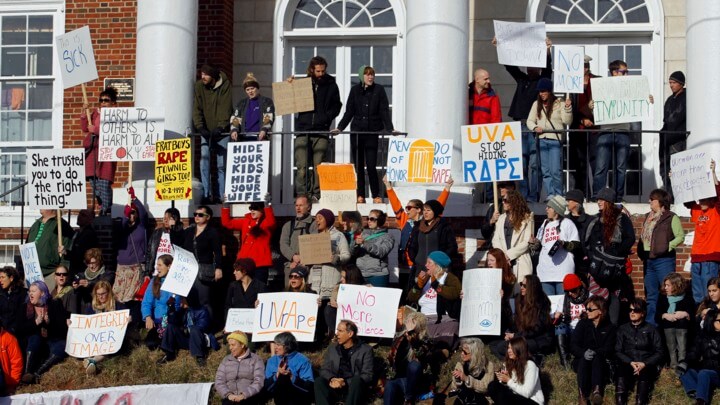We believe that rape and racism exist in this country. So why, then, are we giving racists and rapists a free pass while we scrutinize their victims?
This article was made possible because of the generous support of DAME members. We urgently need your help to keep publishing. Will you contribute just $5 a month to support our journalism?
Two stories dominating my social-media feeds of late have begun to run together in my mind: the nationwide protests against police brutality toward Black citizens, and the unfolding story of an alleged rape at University of Virginia, which may or may not have happened as reported in a recent Rolling Stone article. Both reveal our unfortunate cultural preference for believing in bogeymen, rather than facing facts about violence and power.
As a society, we (mostly) acknowledge that corrosive, potentially deadly racism, as an abstract concept, exists. But of course, everyone worth mentioning abhors it! How can you call this a racist society, when we have a 50-year-old Civil Rights Act and a Black president and everything? Michael Brown, Eric Garner, John Crawford, Tamir Rice, were all killed in unfortunate individual misunderstandings. Or, if you insist on finding a pattern here, the unfortunate result of the victim’s bad choices.
Same goes for rape—we believe it’s a horrible thing that definitely happens, and to be sure, no one is in favor of it. So when feminists talk about “rape culture,” they’re just being their usual, hysterical selves, exaggerating to the point that reasonable people can’t take them seriously. But as soon as someone says they were raped—whether it’s a woman in college, a male celebrity, or an 11-year-old girl, we react with disbelief, immediately trying to reframe the story as an unfortunate individual misunderstanding. Or, if you insist on finding a pattern here, the unfortunate result of the victim’s bad choices.
We live in a country full of racism, but no racists; rape, but no rapists. And the common denominator is power. To believe a rape survivor’s word over that of her male classmate, colleague, teacher, or superior officer is to upset the natural order of things, privileging the voice with less cultural authority over the one we expect to have all the answers. Likewise, believing Dorian Johnson’s testimony over Darren Wilson’s means rejecting lessons we’ve been taught from childhood, both explicitly (the police are there to help you) and implicitly (White people are more trustworthy than Black people).
Women of all backgrounds and African-American men also learn other lessons about surviving in a culture dominated by a group or groups they can never belong to. Don’t wear your skirt too short or your pants too low, for instance. Don’t flirt and don’t talk back. Whatever you do, don’t let yourself end up alone with one of them. If you follow these rules and you’re lucky, you’ll avoid provoking a more powerful White man to violence—and if you can’t avoid that, at least you’ll stand a chance of not being blamed for it.
Ha ha, just kidding. Of course you’ll be blamed. Even if you got it on video, we will find a way to hold you responsible, because blaming anyone but you would open entirely too large a can of worms.
As a society, we’re happy to offer our love and support to victims of power-based violence, but holding actual human perpetrators accountable is another story. We prefer our racists in white hoods and our rapists in ski masks, so we never have to confront the abusive, domineering, murderous upstanding citizens in our midst. The ones who attend our churches, teach in our schools, and ostensibly protect our communities. The ones who couldn’t possibly do something like that. The ones who do things like that, every single day.
We cannot continue this way, insisting that violent crimes of power are misunderstandings, or hoaxes, or the inevitable consequence of a victim’s behavior. We cannot keep pretending we don’t see the patterns. As President Obama said recently, “It used to be folks would say, well, maybe [they] are exaggerating, maybe some of these situations aren’t what they describe. But what we’ve now seen on television for everybody to see—gives us an opportunity, I think, to finally have the kind of conversation that’s been a long time coming.”
The president also said this year, “This is not an abstract problem that goes on in other families or other communities. It affects every one of us … We have the power to do something about it. As a government, as a nation, we have the capacity to stop [it], support those who survived it, and bring perpetrators to justice.”
In the first instance, he was speaking about police brutality against Black citizens, and in the second, about sexual assault—but it could as easily be the other way around. In both cases, the challenge to us is the same: We must listen to victims and resist injustice, even if it means confronting unpleasant facts about people we love, respect, and admire. We can’t keep defending a status quo that allows murderers and rapists to walk free.
